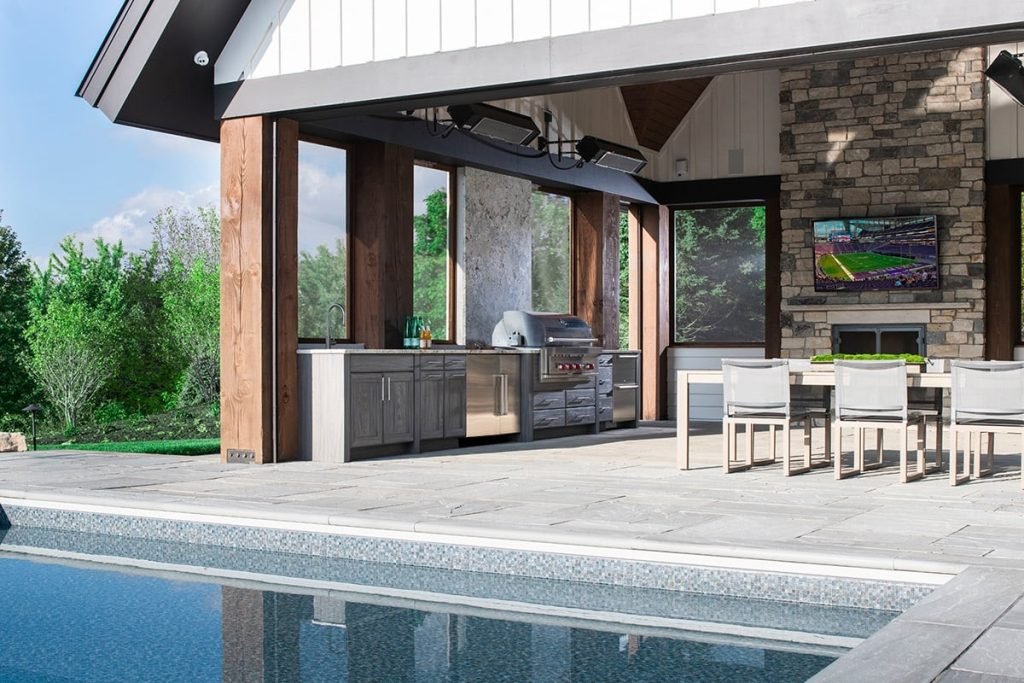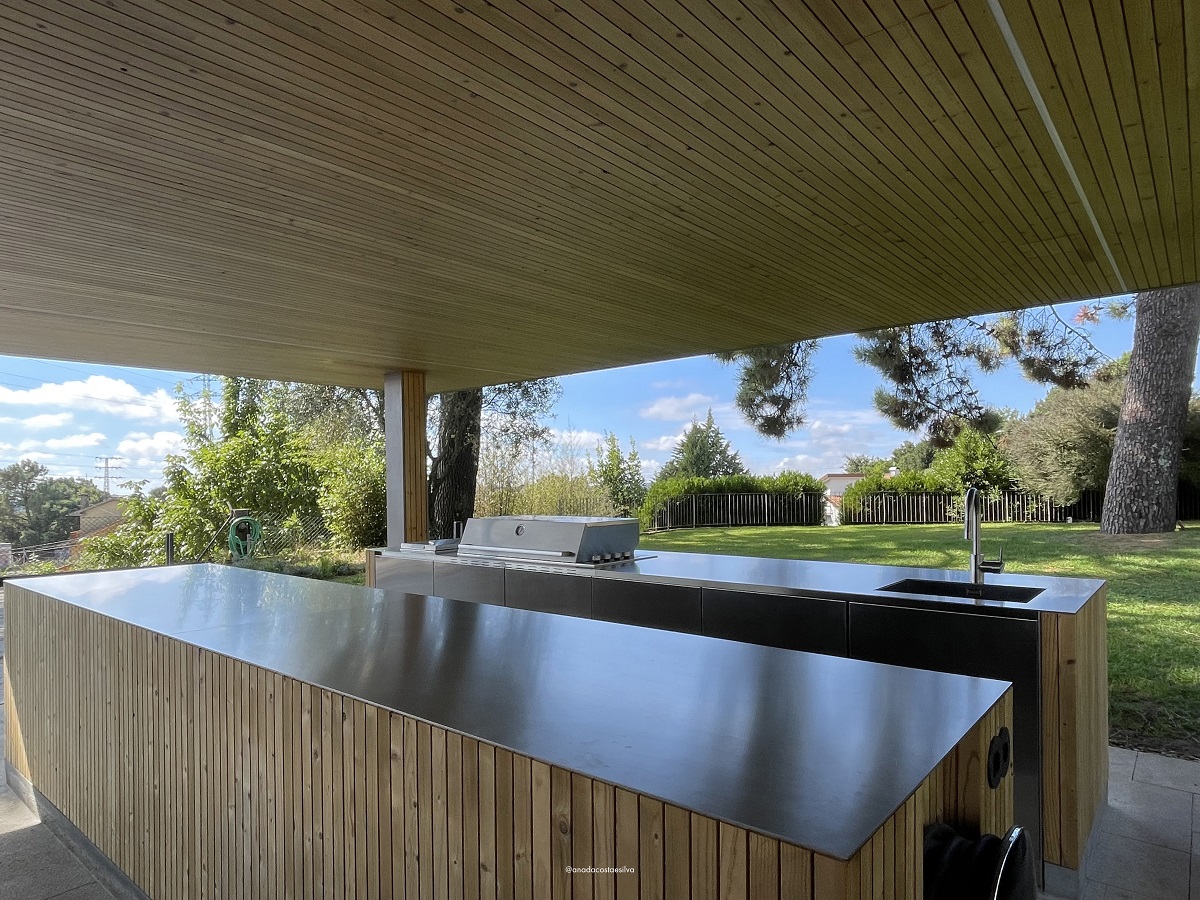Creating an eco-friendly outdoor kitchen is more than just a trend; it’s a commitment to sustainability, innovation, and aesthetic appeal. Today’s homeowners are increasingly prioritizing eco-conscious choices without sacrificing style or functionality. An outdoor kitchen built with sustainable outdoor materials, recycled countertop ideas, and eco-smart appliances not only elevates your backyard but also minimizes environmental impact. From solar-assisted cooking setups to green fuel outdoor grills, these ideas are revolutionizing outdoor living. Embracing eco-design principles allows you to blend beauty with responsibility, turning your outdoor space into a sustainable sanctuary for generations to come.
Designing an Eco-Friendly Outdoor Kitchen: A Comprehensive Guide

Designing an eco-friendly outdoor kitchen begins with thoughtful planning that embeds sustainability at every level. The first step involves assessing your space—consider the climate, sunlight exposure, and natural landscape—to tailor your design accordingly. Incorporate principles of eco-design outdoor kitchens, such as maximizing natural light and optimizing air circulation, which not only enhances comfort but reduces reliance on artificial lighting and ventilation. Additionally, selecting durable, eco-compatible materials ensures your kitchen withstands the elements while minimizing environmental impact. This holistic approach creates a space that is both beautiful and responsible, encouraging a harmonious relationship between nature and culinary craftsmanship.
Furthermore, integrating smart technology and energy-efficient appliances elevates sustainability. A solar-assisted cooking setup can offset traditional power use and extend your outdoor kitchen’s functionality—imagine preparing meals powered by the sun! Think about incorporating rainwater harvesting systems or compost bins to manage waste sustainably. Addressing these aspects early in the design process guarantees a functional, eco-friendly outdoor kitchen that seamlessly combines form and purpose. It’s about creating a space that not only looks stunning but also champions eco-conscious living—proof that style and sustainability can coexist beautifully.
Sustainable Choices: Selecting Eco-Friendly Materials for Outdoor Kitchens

Every choice of material impacts your outdoor kitchen’s ecological footprint. Opting for sustainable outdoor materials—such as recycled metals, sustainably harvested hardwoods, and eco-friendly sealants—sets the foundation for a greener backyard culinary space. For instance, bamboo, a rapidly renewable resource, can be used for cabinetry or decorative elements, providing durability and aesthetic appeal. Likewise, reclaimed wood offers a rustic charm and reduces demand for newly harvested timber, making it a smart eco-choice. When selecting materials, prioritize those with low volatile organic compounds (VOCs) and non-toxic finishes to ensure indoor air quality remains uncompromised.
In addition to the primary structure, consider eco-friendly outdoor cabinetry, flooring, and fixtures that align with sustainable principles. Composite decking made from recycled plastics provides durability with minimal environmental impact, while natural stone pavers reduce chemical usage and promote eco-diversity. Using locally sourced materials minimizes transportation emissions and supports local economies. The key is to balance aesthetics, function, and sustainability—crafting an outdoor kitchen that’s not just eco-friendly but also resilient and stylish. Choosing eco-conscious materials is a fundamental step to ensure your outdoor cooking space leaves a positive footprint on the planet.
Recycled Countertops: Innovative and Sustainable Ideas for Outdoor Kitchens

Countertops are a focal point in any kitchen design, and recycled countertop ideas are transforming traditional aesthetics into environmentally responsible options. Recycled glass countertops, for example, combine vibrant colors with durability, creating a stunning, one-of-a-kind surface that celebrates repurposed materials. Similarly, countertops made from recycled concrete aggregates or reclaimed wood not only reduce waste but also inject character and history into your outdoor space. These innovative surfaces challenge the notion of beauty, proving that sustainability and style can go hand-in-hand.
Beyond aesthetics, recycled countertops can enhance the overall eco-efficiency of your outdoor kitchen. They tend to be highly durable, resistant to stains and heat, making them ideal for outdoor conditions. Installing recycled countertops demonstrates a commitment to reducing landfill waste while creating a visually striking environment. Plus, ongoing innovations in recycled material fabrication mean more options are becoming available—each with unique textures, colors, and sustainable impacts. By choosing recycled countertops, you’re making a bold statement that environmental responsibility need not compromise elegance, inspiring others to rethink traditional design standards.
Harnessing Solar Power: Setting Up a Solar-Assisted Cooking System Outdoors
Harnessing solar power for outdoor cooking offers an exciting pathway to reduce reliance on fossil fuels and mitigate carbon emissions. A solar-assisted cooking setup entails installing solar panels to power appliances such as electric grills, rotisseries, or even solar ovens—devices designed specifically to concentrate and utilize sunlight for cooking. The beauty of this system lies in its silent, emissions-free operation, making your outdoor culinary space entirely self-sufficient and environmentally friendly.
Designing a solar-powered outdoor kitchen requires strategic positioning of panels to maximize sunlight exposure throughout the day. Integrating foldable or movable solar arrays provides flexibility, allowing you to adapt to changing sunlight angles. Moreover, complementing solar-assisted systems with battery storage can enable you to cook during evenings, further increasing energy autonomy. This approach is particularly appealing in areas with abundant sunlight, making your outdoor space a model of innovation and sustainability. Embracing solar power not only reduces your carbon footprint but also educates and inspires everyone who steps into your eco-conscious outdoor kitchen.
Green Fuel Options: Exploring Eco-Friendly Alternatives for Outdoor Grills
Traditional outdoor grills fueled by propane or charcoal are iconic, but they are also significant sources of greenhouse gases and environmental pollution. Fortunately, green fuel outdoor grills—such as those powered by bioethanol, propane blends with lower emissions, or even electricity—offer cleaner alternatives that align with sustainable outdoor design. Bioethanol, derived from renewable biomass, burns with minimal soot and smell, making it an eco-smart choice for grilling while maintaining the traditional experience.
Another interesting avenue is investing in solar-powered or battery-electric outdoor grills, which eliminate combustion altogether. These systems rely on renewable energy, reduce harmful emissions, and often require less maintenance. When selecting eco-design outdoor kitchens, it’s vital to consider the environmental impacts of all appliances, ensuring that each component supports your sustainability goals. Incorporating green fuel options demonstrates a commitment to reducing pollutants and embracing eco-conscious innovation, inspiring others and setting a responsible example.
Eco-Design Principles: Integrating Sustainability into Outdoor Kitchen Aesthetics
Infusing your outdoor kitchen with eco-design principles involves more than just selecting eco-friendly materials and appliances; it’s about creating a cohesive aesthetic that celebrates sustainability. This begins with thoughtful landscaping—planting native, drought-resistant plants reduces water usage while adding natural beauty. Incorporating living walls or vertical gardens with edible herbs not only enhances visual appeal but also increases biodiversity and food security.
Additionally, sustainable outdoor design emphasizes energy efficiency, water conservation, and waste reduction. Strategic shading elements, such as pergolas with climbing plants, can minimize cooling needs and enhance comfort. Lighting that utilizes LEDs or alternative energy sources reduces electricity consumption and adds ambiance. Overall, this holistic approach aligns environmental consciousness with visual harmony, transforming your outdoor kitchen into a space where design and ecology coexist seamlessly, inspiring sustainable living in every detail.
Conclusion
Embracing eco-friendly outdoor kitchens is both an inspiring and pragmatic way to enhance outdoor living while championing environmental responsibility. From selecting sustainable outdoor materials and recycled countertop ideas to adopting innovative solar-assisted cooking systems and green fuel outdoor grills, this journey embodies a harmonious blend of aesthetics and sustainability. Integrating these eco-design principles ensures that your outdoor kitchen is not only functional and beautiful but also reduces its ecological footprint, encouraging sustainable choices that benefit both your family and the planet. Building an outdoor culinary space rooted in eco-conscious practices transforms your backyard into a green sanctuary—where style, innovation, and environmental stewardship flourish side by side.






